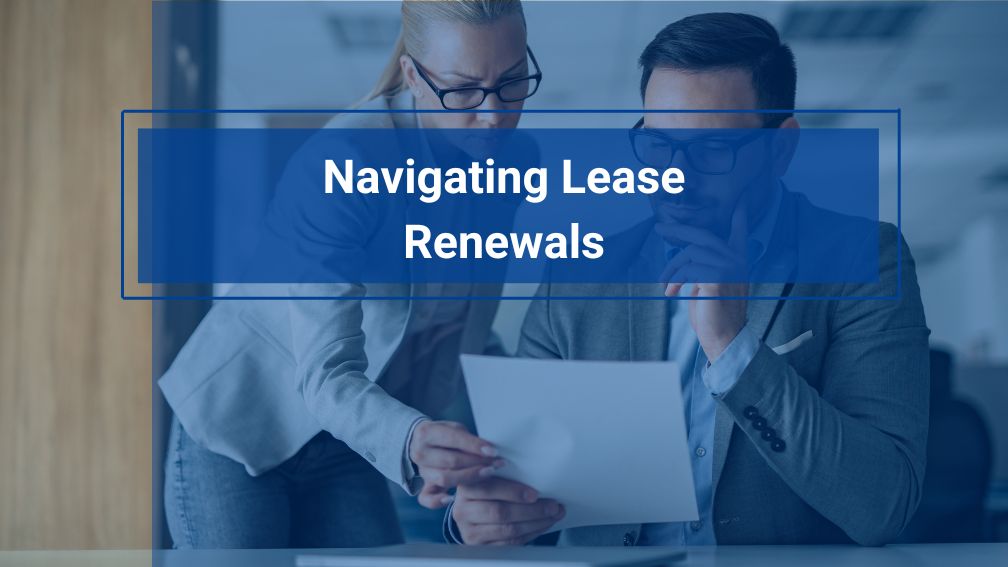Navigating Commercial Lease Renewals
Last Updated on April 18, 2024 by Morgan Beard
For tenants, understanding when to initiate the lease renewal process can make all the difference between securing favorable terms and feeling the pressure of last-minute decisions. Navigating lease renewals requires careful planning, negotiation skills, and a deep understanding of your business needs. In this blog post, we’ll explore the key considerations for commercial tenants when it comes to commercial lease renewals and provide tips on how to secure favorable terms.
When to Start the Renewal Process
One of the most common mistakes that commercial tenants make is waiting until the last minute to begin the lease renewal process. This can put you in a weak negotiating position and limit your options. Ideally, you should start thinking about your lease renewal at least 12 months before your current lease expires. This gives you ample time to assess your business needs, research market conditions, and engage in negotiations with your landlord.
Assessing Your Business Needs
Before you begin the lease renewal process, it’s essential to take stock of your current business needs and how they may have changed since you first signed your lease. Consider factors such as:
- Space requirements: Do you need more or less space than you currently have?
- Location: Is your current location still suitable for your business?
- Amenities: Are there any additional amenities or services that you require?
- Budget: How much can you afford to spend on rent?
By clearly defining your business needs, you’ll be better equipped to negotiate a lease that aligns with your goals.
Researching Market Conditions
To negotiate effectively, you need to have a good understanding of the current market conditions. Research the average rental rates for similar properties in your area, as well as the vacancy rates and any new developments that may impact the market. This information will help you determine whether your landlord’s proposed terms are reasonable and competitive.
Engaging in Negotiations
Once you have a clear understanding of your business needs and the market conditions, it’s time to engage in negotiations with your landlord. Be prepared to discuss your requirements and any changes you’d like to see in the new lease. This may include things like rent concessions, tenant improvements, or more flexible lease terms.
It’s important to approach negotiations with a collaborative mindset rather than an adversarial one. Remember that your landlord is also a business owner and wants to maintain a good relationship with their tenants. By focusing on finding mutually beneficial solutions, you’re more likely to achieve a positive outcome.
Utilizing Leasing Software
In today’s digital age, managing your commercial leases has become more streamlined with the help of lease administration software. These tools allow you to store, track, and analyze your leases in a centralized location, making it easier to stay organized and informed throughout the renewal process.
By storing your leases in a lease administration software, you can:
- Access important lease data quickly and easily
- Set up alerts for key dates and deadlines
- Generate reports on your lease portfolio
- Collaborate with team members and stakeholders
Storing your leases in a lease administration software tool is crucial for staying on top of your lease obligations and ensuring that you’re prepared for renewals well in advance. It can also help you identify opportunities for cost savings and negotiate more favorable terms based on the insights gained from your lease data.
Reviewing the Lease Agreement
Before signing a new lease, it’s crucial to carefully review the agreement with your legal counsel. Pay close attention to any changes in the terms and conditions, as well as any additional costs or fees that may have been added. Make sure that you fully understand your rights and obligations under the new lease before committing to it.
Navigating Lease Renewals
Navigating lease renewals can be a complex and time-consuming process, but by starting early, assessing your business needs, researching market conditions, and engaging in collaborative negotiations, you can secure favorable terms that support your long-term success. Remember to approach the process with a strategic mindset and don’t hesitate to seek the advice of legal and real estate professionals to ensure that you’re making informed decisions.
By following these tips and being proactive in your approach to lease renewals, you can create a strong foundation for your business and avoid the stress and uncertainty of last-minute decisions.
